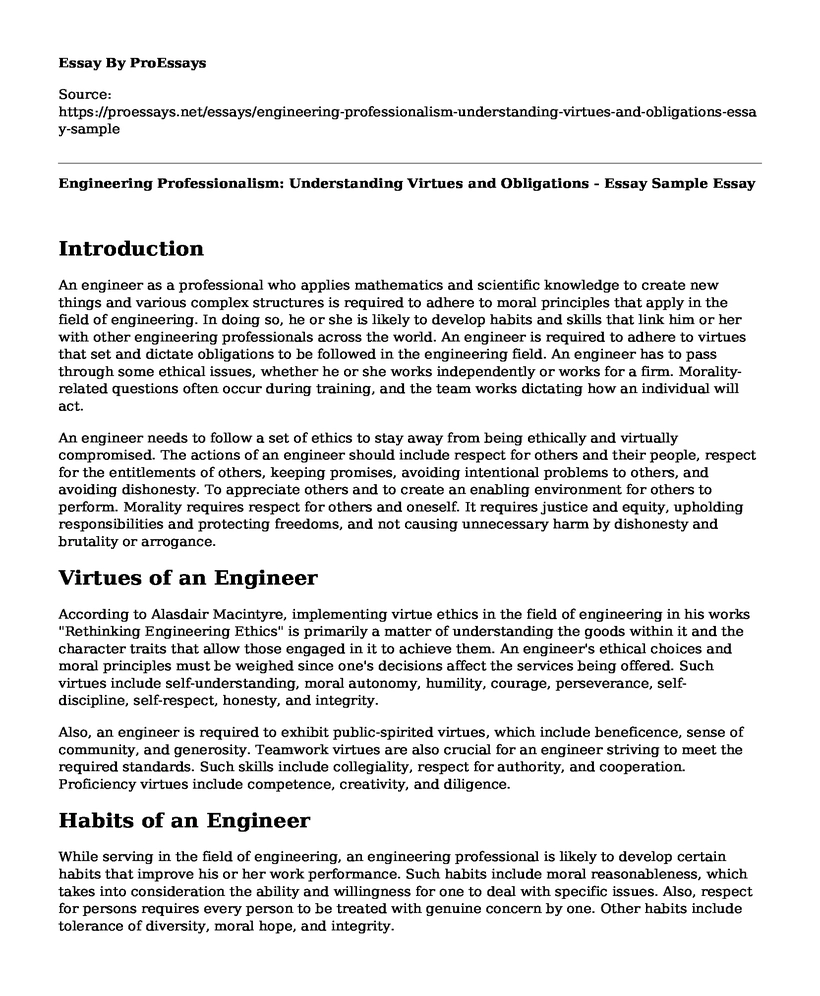Introduction
An engineer as a professional who applies mathematics and scientific knowledge to create new things and various complex structures is required to adhere to moral principles that apply in the field of engineering. In doing so, he or she is likely to develop habits and skills that link him or her with other engineering professionals across the world. An engineer is required to adhere to virtues that set and dictate obligations to be followed in the engineering field. An engineer has to pass through some ethical issues, whether he or she works independently or works for a firm. Morality-related questions often occur during training, and the team works dictating how an individual will act.
An engineer needs to follow a set of ethics to stay away from being ethically and virtually compromised. The actions of an engineer should include respect for others and their people, respect for the entitlements of others, keeping promises, avoiding intentional problems to others, and avoiding dishonesty. To appreciate others and to create an enabling environment for others to perform. Morality requires respect for others and oneself. It requires justice and equity, upholding responsibilities and protecting freedoms, and not causing unnecessary harm by dishonesty and brutality or arrogance.
Virtues of an Engineer
According to Alasdair Macintyre, implementing virtue ethics in the field of engineering in his works "Rethinking Engineering Ethics" is primarily a matter of understanding the goods within it and the character traits that allow those engaged in it to achieve them. An engineer's ethical choices and moral principles must be weighed since one's decisions affect the services being offered. Such virtues include self-understanding, moral autonomy, humility, courage, perseverance, self- discipline, self-respect, honesty, and integrity.
Also, an engineer is required to exhibit public-spirited virtues, which include beneficence, sense of community, and generosity. Teamwork virtues are also crucial for an engineer striving to meet the required standards. Such skills include collegiality, respect for authority, and cooperation. Proficiency virtues include competence, creativity, and diligence.
Habits of an Engineer
While serving in the field of engineering, an engineering professional is likely to develop certain habits that improve his or her work performance. Such habits include moral reasonableness, which takes into consideration the ability and willingness for one to deal with specific issues. Also, respect for persons requires every person to be treated with genuine concern by one. Other habits include tolerance of diversity, moral hope, and integrity.
Skills of an Engineer
While striving to serve the globe, an engineer is likely to develop some skills that will enable him or her excel in his or her area of specialization. Such skills include practical technical expertise, creativity, interpersonal skills, teamwork skills, ability to deliver under pressure, problem-solving skills, verbal and written communication skills, and business awareness.
Conclusion
Conclusively, engineering virtues, skills, and morals are not enforced. They are those deeds that one gains while he or she is in practice. They are well understood as an engineer's inner self's motivation and guidelines. The subconscious sorts things out as good or bad based on a few variables. These are the concepts that help to frame our personalities in such a way that we can differentiate between right and wrong. Morals and virtues also dictate that one is good to everyone, that one says only the facts, that one does not go against what one knows is true, that one has chastity, that one avoids stealing, and that one is a good human being. One's personality always characterizes habits and virtues in engineering. Attributes can be modified according to one's views because they depend entirely on one's understanding of ethical values.
Cite this page
Engineering Professionalism: Understanding Virtues and Obligations - Essay Sample. (2023, Apr 06). Retrieved from https://proessays.net/essays/engineering-professionalism-understanding-virtues-and-obligations-essay-sample
If you are the original author of this essay and no longer wish to have it published on the ProEssays website, please click below to request its removal:
- The Future of Design Teams and BIM Essay
- The Development of an Electric Highbrid Vehicle with Range Extender
- Paper Example on Cockpit: Aircraft's Command Center for Navigation & Control
- Essay Example on Descending Motor Pathways: Rubro, Corticospinal & Reticulospinal
- Sudan: North-Eastern African Nation of Arabian Migrants' Descendants - Essay Sample
- Global Natural Gas Demand: Price & Income Elasticities Analysis - Essay Sample
- Engineering Research for Cost-Effectiveness & Value Addition - Essay Sample







